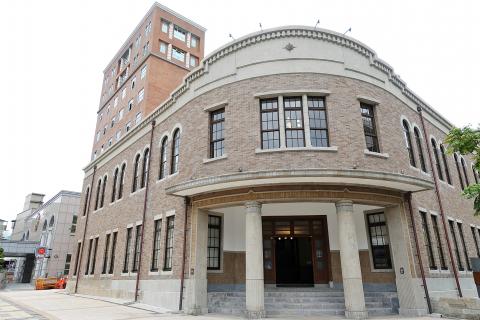Once a police station, the Taiwan New Cultural Movement Memorial Hall now attracts day trippers, who go there mainly to see a detention center and torture chamber that were housed in the building’s dingy interior.
Built in 1933 during the Japanese colonial era, the baroque-style building on Ningxia Road in Taipei’s Datong District (大同) was nothing special, said a police officer who worked there for 12 years before moving to a new precinct nearby.
During the Japanese colonial era it was the Taipei North Police Station and after World War II it became Datong Police Station, which was staffed by about 200 officers crowded into the drab interior, the officer said, speaking on condition of anonymity.

Photo: CNA
Files were stacked haphazardly everywhere and noises from the street penetrated the walls day and night, he said.
However, the police station was infamous for its torture chamber, which was a water dungeon about half the height of an average person, the police officer said.
He said that during time he spent at the police station, from about 2000 to 2012, no one was ever put in the chamber, but it always mysteriously contained water.
Another grim feature of the station was its detention room, a half-moon shaped enclosure that allowed police to keep an eye on a prisoner from almost any angle, he said.
That was the space in which Chiang Wei-shui (蔣渭水), a key figure in Taiwan’s cultural and intellectual movement in the 1920s, was held four times on charges of posing a threat to public security during the Japanese colonial era, the Taipei City Government said.
The police station was designated a municipal historical site in 1998 and from 2006 was used as the preparatory office for the establishment of the Taiwan New Cultural Movement Memorial Hall.
In 2015, work began to convert the structure into a historical attraction and the museum opened in October last year, the city government said.
Now visitors can truly appreciate the enigmatic character of the structure, the police officer said.
A seasonal exhibition featuring Taiwanese cultural movements in the 1920s is to be held until June 23, the museum’s Web site said.

Taiwanese can file complaints with the Tourism Administration to report travel agencies if their activities caused termination of a person’s citizenship, Mainland Affairs Council Minister Chiu Chui-cheng (邱垂正) said yesterday, after a podcaster highlighted a case in which a person’s citizenship was canceled for receiving a single-use Chinese passport to enter Russia. The council is aware of incidents in which people who signed up through Chinese travel agencies for tours of Russia were told they could obtain Russian visas and fast-track border clearance, Chiu told reporters on the sidelines of an event in Taipei. However, the travel agencies actually applied

Japanese footwear brand Onitsuka Tiger today issued a public apology and said it has suspended an employee amid allegations that the staff member discriminated against a Vietnamese customer at its Taipei 101 store. Posting on the social media platform Threads yesterday, a user said that an employee at the store said that “those shoes are very expensive” when her friend, who is a migrant worker from Vietnam, asked for assistance. The employee then ignored her until she asked again, to which she replied: "We don't have a size 37." The post had amassed nearly 26,000 likes and 916 comments as of this

New measures aimed at making Taiwan more attractive to foreign professionals came into effect this month, the National Development Council said yesterday. Among the changes, international students at Taiwanese universities would be able to work in Taiwan without a work permit in the two years after they graduate, explainer materials provided by the council said. In addition, foreign nationals who graduated from one of the world’s top 200 universities within the past five years can also apply for a two-year open work permit. Previously, those graduates would have needed to apply for a work permit using point-based criteria or have a Taiwanese company

The Shilin District Prosecutors’ Office yesterday indicted two Taiwanese and issued a wanted notice for Pete Liu (劉作虎), founder of Shenzhen-based smartphone manufacturer OnePlus Technology Co (萬普拉斯科技), for allegedly contravening the Act Governing Relations Between the People of the Taiwan Area and the Mainland Area (臺灣地區與大陸地區人民關係條例) by poaching 70 engineers in Taiwan. Liu allegedly traveled to Taiwan at the end of 2014 and met with a Taiwanese man surnamed Lin (林) to discuss establishing a mobile software research and development (R&D) team in Taiwan, prosecutors said. Without approval from the government, Lin, following Liu’s instructions, recruited more than 70 software